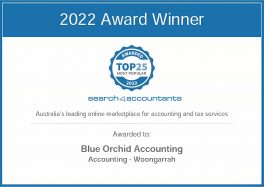Do you own a holiday rental property? You could be eligible for valuable tax deductions.
Holiday properties are a common type of investment property here in Australia.
Holiday rentals are usually managed by an agent or real estate company, for a fee. Although the operating costs may be higher than other types of rentals, the combination of high rents, hands-free operation, property value growth and tax deductions, make the holiday rental property an attractive investment for some people.
Completing your tax return is important to ensure, that you receive every tax advantage you deserve. You can claim a lot of your expenses, but the ATO watches carefully, and they are remarkably good at detecting false or “unsubstantiated” claims. So, let’s cover some of the basics to help you manage the tax deductions of your holiday property, and your claim within the tax return….
The first thing to know, is that keeping records about your expenses is not optional. If you don’t keep records and save the receipts, you could lose out in tax deductions every year – and you’ll be vulnerable to serious ATO matters if your claims are reviewed or audited.
Is my family holiday home eligible for tax deductions?
You are only eligible for holiday rental tax deductions for the period when a home is advertised and available for rent (or is rented out).
Note: Don’t lump all of your expenses together and don’t include expenses for your personal use of the property. The ATO monitors for this type of thing. If the ATO queries your claims, and you can’t provide the time-specific evidence for your expenses – plus show how you calculated the claimed portion – then you could face heavy tax penalties or fines plus the repayment of taxes from previous years.
If you rent out your holiday property, there are numerous deductions you can claim.
What holiday property expenses can I claim as a tax deduction?
Expenses you can claim as tax deductions for your holiday property include:
- Maintenance & repair costs
- Yard maintenance
- Advertising costs
- Pest control
- Insurance
- Cleaning
- Body corporate fees
- Council rates
- Property insurance
- Interest (on the funds borrowed to purchase the home)
- Depreciating assets
- Capital works deductions
- …and more.
Remember, you can’t claim holiday rental tax deductions for periods when the property is used for personal purposes (which includes staying there yourself, letting it to family & friends, or time when it’s not advertised and available for rent).
Can I claim travel expenses when I inspect or repair a holiday rental property?
From 1 July 2017, travel expenses have been made non-deductible to the extent that the travel has been incurred in gaining or producing assessable income from the use of residential rental premises. Nor are such costs included in the cost base of the rental property for capital gains tax purposes. In this context, travel expenses include the costs of all travel to inspect, maintain or collect rent from a residential rental property and will include motor vehicle expenses, taxi or hire car costs, airfares, public transport costs and any related meals or accommodation costs incurred for the above purpose.
However, the above change will not apply to an entity if they incurred such travel costs in the course of carrying on a business (including a rental property business), or if the taxpayer is either a corporate tax entity, a superannuation fund other than an SMSF, a public unit trust, a managed investment trust, or a partnership or a unit trust where each member of the partnership or unit trust is one of the aforementioned excluded entities. Nor will the change apply where the premises are commercial premises as opposed to residential premises used for residential accommodation.
The examples below will help you determine what holiday rental tax deductions you can claim.
1. My holiday rental property is leased out frequently.
There are similar rules and regulations between a general rental property and a holiday home, such as claiming expenses for the property for the duration of the lease.
However, with a holiday rental you will need to divide your claimable expenses if your holiday home is not genuinely available or is ever used for personal purposes such as:
- When you rent it out free of charge privately to friends, family or colleagues.
- When you discount the rent to family or friends and charge them less than usual.
- When you use the property yourself.
- When you choose to leave it vacant and don’t advertise it for rent (or don’t accept rental offers).
2. Is my holiday property “genuinely available”
The ATO are crack down on holiday homeowners who don’t genuinely try to rent out their property. A few indicators of this include;
- Unreasonably limited advertising, such as advertising only at work, to friends or outside common holiday periods.
- Unreasonable conditions for renting, such as requiring references for short stays or restricting children and pets, which significantly limits the pool of potential renters for a property.
- Rejecting rental enquiries or offers for inadequate reasons.
The ATO could review the above issues (and more) to determine if the property is a genuine holiday property (or a private holiday home).
3. My holiday property is not advertised or available right now
If you don’t rent out the property at all, you cannot claim any expenses relating to the property. Hold on to your receipts anyway – when it comes time for you to sell that property, you will need to have those records to help determine your capital loss or gain.
4. How to divide the holiday rental tax deductions between rental and private usages.
Holiday property deductions only apply to the periods of time when the property is rented or available for rent. You can’t claim tax deductions for a holiday rental property if it is being kept vacant or used for non-rental or private purposes.
For example, John and Natalie own a holiday rental property on the Gold Coast.
The expenses for operating and maintaining the holiday home were $25,000 for the tax year, including interest, maintenance, cleaning, repairs and rental agents.
The property is available to rent for $550.00 per week. It was occupied for 32 weeks in the year, earning $17,600 in rental income. It was available for rent, but vacant, for 20 weeks. Over Christmas John and Natalie stayed in the property themselves for 6 weeks. Therefore, the property was either available for rent or was occupied by renters for 46 weeks out of 52 weeks.
Remember, John and Natalie can only claim expenses for weeks when the property was genuinely available for rent on the market and/or was rented out.
46 weeks divided by 52 weeks X $25,000 total expenses = $22,115.38 claimable expenses
John and Natalie can claim $22,115.38 in rental property tax deductions between the two of them ($11,057.69 each.) in their tax returns.
5. How to divide the holiday property tax deductions between two owners
If you share your property with another person, you will need to claim the deductions correctly. The ATO watches out for couples who split income and deductions unequally for tax advantages, and even hands out penalties. If two partners own equal shares of a property, then each can each claim equal shares of the expenses. If one partner owns 20% of the property, that person can only claim 20% of the expenses.
These tips are of general nature only. Speak to a qualified tax agent to get advice on the tax breaks that are relevant to your situation.

Since 2011, Blue Orchid Accounting has been providing clients throughout the Central Coast with a comprehensive range of taxation and accounting services. We strive to provide friendly, straightforward advice, helping ensure you’re enabled to make smarter financial decisions and further safeguard your wealth.













